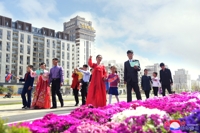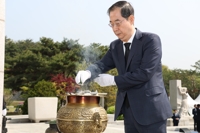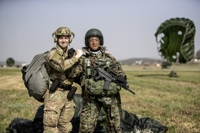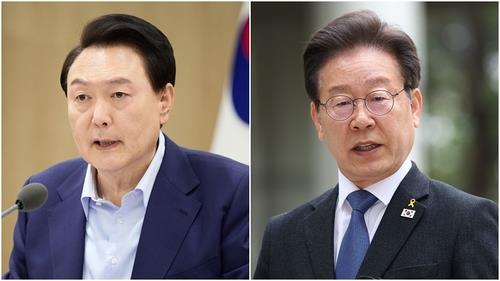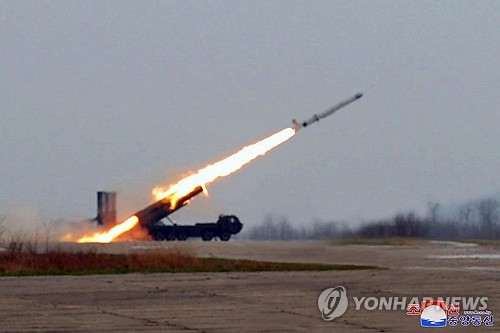(EDITORIAL from Korea JoongAng Daily on Dec. 8)
Korea's diplomacy tested
The U.S. government has decided to diplomatically boycott the Beijing Winter Olympics scheduled for February. The boycott decision made about 50 days before the Winter Games begin means the U.S. will only send athletes -- not diplomatic officials -- to the Games, including to its opening and closing ceremonies. White House Press Secretary Jen Psaki cited "China's ongoing genocide and crimes against humanity in Xinjiang and other human rights abuses" as the reason for the diplomatic boycott.
The U.S. government's decision to diplomatically boycott the Beijing Olympics was anticipated long ago. As expected, Joe Biden's administration chose a diplomatic boycott instead of an all-out boycott to avoid criticism of political exploitation of the Olympiad. What's left for the U.S. administration is rallying support from allies. The issue will certainly be dealt with in The Summit of Democracy on Thursday and Friday and the G7 Foreign Ministers' Meeting in London next week.
Korea is at a crossroads. The government need not hurry to make a decision, yet cannot avoid making one at some point. As wise and practical diplomacy is needed, it must read the zeitgeist of the times carefully.
First of all, the government cannot ignore the human rights issue in China. The U.K., Canada and Australia are joining the U.S. crusade for that reason. The European Union already adopted a resolution to boycott the Games. The Moon Jae-in administration must first consider South Korea's enhanced national prestige as a member of the developed group of countries. Even if the government decides not to join the boycott, the decision should be respected by the international community. But the government can hardly find a cause more powerful than human rights.
If Korea makes a wrong decision, its national interest and image will be damaged. There is a precedent. After former President Park Geun-hye took to a podium on Tiananmen Square in 2015 to observe a Chinese military parade with Chinese President Xi Jinping and Russian President Vladimir Putin — and after the scene was broadcast live across the world — Western society was not impressed.
On South Korea's part, a diplomatic boycott of the Games is a very hard decision to make. It will not help the Moon administration bring North Korean leader Kim Jong-un to the negotiating table. The government is exerting all diplomatic efforts to realize an end-of-war declaration. But that's going nowhere. The Moon administration must wake up from its pipe dream that it can solve Korean Peninsular issues through a diplomatic stunt in Beijing.
(END)
-
 Overdue debut of Korean abstract art pioneer Yoo Young-kuk at Venice Biennale
Overdue debut of Korean abstract art pioneer Yoo Young-kuk at Venice Biennale -
 Defense chief says N. Korea's hypersonic missile 'unsuccessful' in last-stage glide flight
Defense chief says N. Korea's hypersonic missile 'unsuccessful' in last-stage glide flight -
 Relax, immerse yourself in scents at Venice Biennale's Korean Pavilion
Relax, immerse yourself in scents at Venice Biennale's Korean Pavilion -
 N. Korea has capability to genetically engineer biological military products: U.S. report
N. Korea has capability to genetically engineer biological military products: U.S. report -
 S. Korea marks 30th anniv. of Korean Pavilion at Venice Biennale with contemporary art
S. Korea marks 30th anniv. of Korean Pavilion at Venice Biennale with contemporary art
-
 Overdue debut of Korean abstract art pioneer Yoo Young-kuk at Venice Biennale
Overdue debut of Korean abstract art pioneer Yoo Young-kuk at Venice Biennale -
 Relax, immerse yourself in scents at Venice Biennale's Korean Pavilion
Relax, immerse yourself in scents at Venice Biennale's Korean Pavilion -
 Artist Lee Bae captures ethereal Korean aesthetics at Venice Biennale
Artist Lee Bae captures ethereal Korean aesthetics at Venice Biennale -
 S. Korea marks 30th anniv. of Korean Pavilion at Venice Biennale with contemporary art
S. Korea marks 30th anniv. of Korean Pavilion at Venice Biennale with contemporary art -
 Defense chief says N. Korea's hypersonic missile 'unsuccessful' in last-stage glide flight
Defense chief says N. Korea's hypersonic missile 'unsuccessful' in last-stage glide flight
-
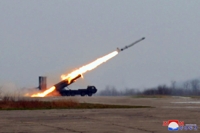 (2nd LD) N. Korea says it conducted 'super-large warhead' test for strategic cruise missile
(2nd LD) N. Korea says it conducted 'super-large warhead' test for strategic cruise missile -
 N. Korea says it conducted 'super-large warhead' test for strategic cruise missile
N. Korea says it conducted 'super-large warhead' test for strategic cruise missile -
(URGENT) N. Korea conducted 'super-large warhead' test for strategic cruise missile: KCNA
-
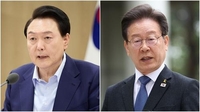 (LEAD) Yoon proposes first-ever meeting with opposition leader
(LEAD) Yoon proposes first-ever meeting with opposition leader -
 (LEAD) Gov't accepts university chiefs' request on med school enrollment quota: PM
(LEAD) Gov't accepts university chiefs' request on med school enrollment quota: PM














